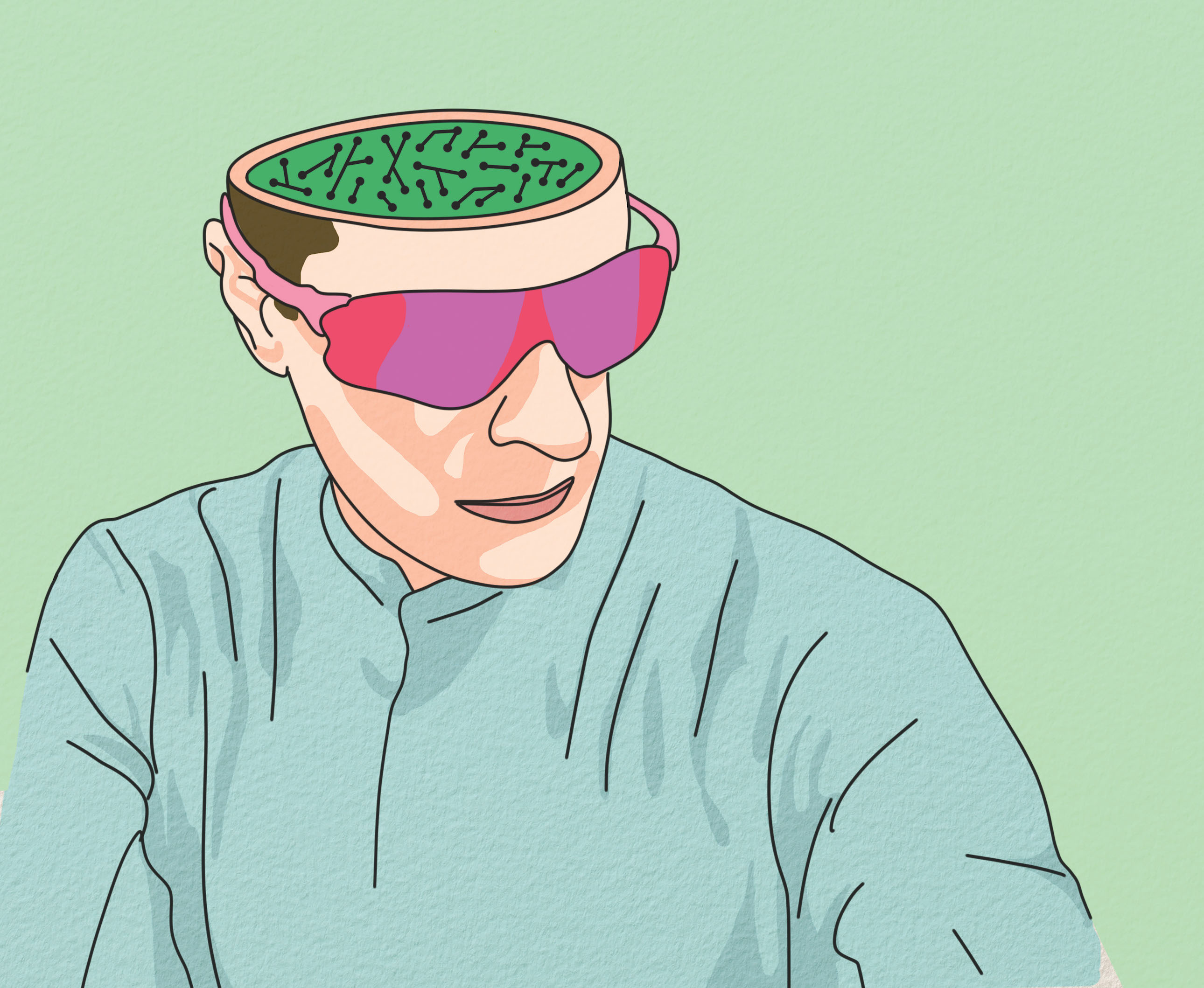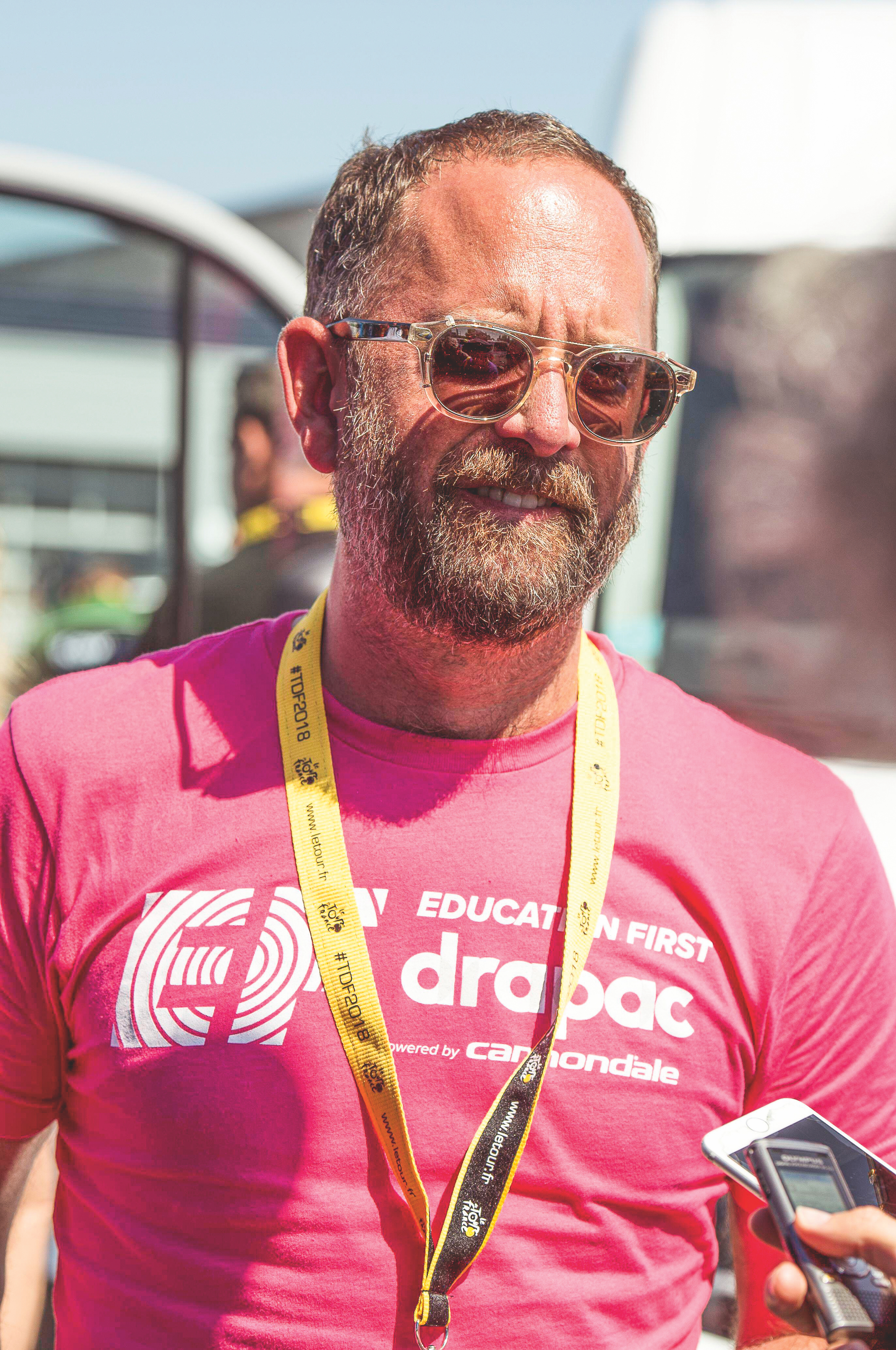
This article was originally published in Cycling Weekly's print edition as part of the WE NEED TO TALK ABOUT series tackling taboos and raising awareness of cycling-related health issues.
Jonathan Vaughters was one of the sport’s best time triallists in the late 1990s and early 2000s, but the American was always aware that people perceived him differently. “I think everyone thought I was funny but a little strange,” says the 50-year-old, who is now team manager of EF Education-EasyPost. “Four guys thought it was cool to be my team-mate, and everyone else would say they’d never want to be in the same room as me. I was messy, I was constantly losing my socks, I always had my nose in a book, I never watched TV, and I never talked about anything normal. To put it bluntly, I thought I was just weird.”
For decades, Vaughters didn’t invest too much energy into thinking about his behavioural quirks. He’d just accepted he was different. But in 2012, he took his young son to be evaluated for ASD – autism spectrum disorder, a neuro-developmental condition that affects how people communicate, interact and learn. There were a few reasons why: “[My son] has this ability to hyper-concentrate on something he’s interested in, but then forgets about everything else going on around him, and he’s always losing stuff,” Vaughters explains. “During the process of him being evaluated, I started thinking, ‘Woah, hold on a minute – I’m like that too’.”
Six years later, in 2018, Vaughters finally went for his own evaluation and sure enough was diagnosed as having a form of ASD partly defined by intensely focusing on specific tasks. “When the team’s future was in jeopardy in 2017, I was so focused on my work to the exclusion of everything else that my marriage failed,” he says. “Asperger’s is pretty difficult in a marriage, and the distraction of being busy with my job resulted in us getting divorced.”
His diagnosis marked him as one of the estimated 1-2% of people worldwide who have ASD. But rather than let it negatively define him, Vaughters believes that he’s been successful in life because of it. “I would partly attribute a failed marriage to Asperger’s, but it’s also the reason why this team has flourished for 20 years, and why as a rider my greatest strength was long, solitary efforts. That fits into the characteristics of someone with Asperger’s.”
Vaughters isn’t the only high-profile retired cyclist with a neurodivergent condition: both three-time Tour de France winner Greg LeMond and Germany’s last winner of the race, Jan Ullrich, have ADHD – attention deficit hyperactivity disorder – and it is thought that between 3-5% of the world’s population do, too. According to one 2021 study, neurodiversity in cycling is “undertreated”, and as many as one in seven cyclists might be neurodivergent. “Why,” though, bemoans Vaughters, “is it something that isn’t widely talked about?” He points out that, to the best of his knowledge, the only well-known figures in pro cycling who are openly neurodivergent are himself and the two mentioned above.

A broad category
Neurodiversity is an umbrella term that was first coined in the late 1990s by the Australian sociologist Judy Singer. It refers to the differing ways in which people’s brains process information, and describes their diverse characteristics and behaviours. Humans vary widely in our neurocognitive abilities and traits – the common claim that certain people are “wired differently” is getting at an important truth. Neurodivergent people find some tasks very easy, others very difficult. While they thrive and excel in the right environment, they typically have issues with concentrating organising and time management. It can lead to inconsistent work or academic performances, and if not managed properly, it can result in low self-esteem and social exclusion.
It is said that 15% of the public have neurodivergent conditions, which may be the result of genetics, birth or physical trauma, immune disorders or nutritional reasons, among other factors. The most common and well-known neurodivergent conditions are dyslexia, dyspraxia (a condition affecting movement and coordination), ADHD, OCD (obsessive compulsive disorder) and Tourette’s syndrome, and many neurodivergent people have symptoms of other neurodevelopmental conditions. We’re going to focus mainly on two types of neurodiversity: ASD, affecting 2% of the population, and ADHD, which has an estimated prevalence of 3-4%.
ADHD is split into three categories: hyperactive/impulsive, inattentive, and a mix of the two. Several studies have estimated that the prevalence rate among elite athletes could be as high as 14%. Treatment to help people with ADHD to concentrate better and to feel calmer includes therapy and medication such as methylphenidate and amphetamine. These stimulants, however, are on the World Anti-Doping Agency’s (WADA) prohibited list, meaning they require a therapeutic use exemption (TUE). Owing to the stigma around TUEs, pro riders may be deterred from seeking the medical help they need.
Feeling different
Similar to Vaughters’s experience, amateur racer Andy Edwards, 52, remembers always feeling like he stood out from the crowd. “I always knew I was different, but I didn’t know why,” he says. “Growing up in a small village in northwest England, I felt like I didn’t belong.” Aged 12, Edwards took up cycling and started racing. “For the first time in my life, I felt I belonged.”

But it wasn’t until 2019, when he was in his 40s, that Edwards, a music business executive, realised he might be neurodivergent. He was working on publishing a report, ‘Diversity In Cycling’ (diversityincycling.com), supported by British Cycling, when the possibility occurred to him. “It made me think more about my own differences. A month after publication, a psychiatrist diagnosed me with ADHD. She also told me I was probably autistic, which was confirmed 18 months later.”
Edwards was stunned by the news. “Getting diagnosed with ADHD was a big deal, but my autism diagnosis was a deeper, more complex experience,” he says. “Autism carries a lot of stigma and is widely misunderstood. A common misconception is that autistic people are not sociable, but that’s not true. I love socialising, but I have a different process than a neurotypical person – mine is more cognitive and less intuitive.”
As with all neurodivergent conditions, autism symptoms vary greatly and manifest in different ways; there’s a reason ‘spectrum’ forms part of the ASD acronym. “Being both autistic and ADHD can be very intense and I often hit burnout,” says Edwards, who competed as a second-cat rider. “The ADHD side of my brain runs at 200mph. I have an abundance of attention and my mind is in a million different places at once. I can be impulsive and forgetful, and I’m often late, including for club runs.”
Laser focus
Vaughters believes that ASD especially is “fairly common in pro cycling” – though I could not fi nd any scientific research to confirm this. “From my experience,” he says, “riders from nations where cycling isn’t a mainstream sport have a higher tendency for having a neurodiversity than, say, French and Italian riders. There are a number of tell-tale signs,” Vaughters continues. “Intense focus is one, as is an intense obsession with detail. For someone with Asperger’s, if only 95% of the details are in place, they will wonder how on earth they can be expected to do their best, caught up on the 5% that is wrong. Everything will fall apart.” He points to his own experience as an example. “I was at my best in a long time trial, in a situation where no other riders were around me, and it was just me, my bike and the road in front of me. I had an ability to push my body to the limit better than most others, simply because I have the mindset of being able to shut everything out and think about one thing and one thing only.”
Edwards expresses a similar sentiment when he explains how people with ASD are “very fixated on certain rituals,” and he recalls the time when he would get into “long, drawn-out arguments on cycling forums that would go on for days about subjects like base miles and Strava data.” He attributes that to his neurodivergent traits.
Suffering in silence
A problem encountered by many is misdiagnosis, or simply not being evaluated at all. While dyslexia is picked up more frequently among the school-age population, people with ADHD and ASD often slip through the cracks because their daily functioning does not seem adversely affected most of the time.
Mikey Mottram is a 33-year-old former international rower turned elite-level gravel rider who was also a Continental pro for Vitus in 2019 and 2020. He and his wife, Olympic rower Caragh McMurtry, who has autism, set up Neurodiverse Sport in 2022 (see box). “Diagnosis is a tool, but not the answer to everything,” says Mottram, who is dyslexic and dyspraxic. “People can appear to fit in, to be ‘normal’, and capable of producing good sporting performances, but inside they can be struggling with a cruel battle, stuck in their heads and trying to get through.”
What’s more, there is a stubborn stigma attached to neurodiversity, and though there is help available, many fear that having a confirmed diagnosis may limit their career and social opportunities. Th e NHS offers free diagnosis, but the current waiting time after a first referral is over 10 months, meaning even fewer people are gaining access to the support they need, disproportionately affecting those from low socioeconomic backgrounds who cannot aff ord to go private.
Embracing diagnosis
Edwards, Mottram and Vaughters are candid about their struggles, but none of them sees neurodivergence as a debilitating handicap. “Getting diagnosed changed my life for the better,” Edwards says. “I still have difficult moments, but I am better at navigating them, and I know what I need from the people around me. Psychiatrists often diagnose medication such as Ritalin, an amphetamine-type substance that helps slow down the brain [by restoring neurotransmitter balance]. I don’t take drugs but have found that hard aerobic exercise does the same job, and cycling fast keeps me focused on what I am doing.”
What is his advice to other riders who suspect they may have a neurodivergent condition? “Let it be your tailwind, not a headwind,” says Edwards. “Get diagnosed, learn as much as you can, and make sure you surround yourself with people who accept you for who you are. Most of all, let your condition propel you forward, not hold you back.”
Mottram agrees: “Cycling gives people with a neurodiversity that dopamine hit in their brain. It’s something to focus on, something to get you through the day without going mad. It gives you a structure and a routine which is often missing for people with neurodiversity. Just being outside is so important for me too.”
Vaughters admits that when he is focused on a task “social niceties might not even come into my mind and other people are not a priority” – and sometimes this causes problems. “In my early management days, things weren’t always smooth, and in hindsight it’s because I wasn’t picking up on social cues or the group’s vibe. There were some pretty harsh lessons and some broken relationships because I didn’t know how to react in certain situations. I did a poor job of managing the personalities in the team. Some experiences have come at a very big cost – I’ve been divorced twice – but lessons are eventually learnt with Asperger’s, and I think I do a better job now.”
Alongside the downsides, his condition has bestowed certain superpowers. “On the flipside,” he says, “the intensity and creativity it takes to continually market a WorldTour team in the United States, where cycling isn’t very strong, is massive. I truly believe my Asperger’s is the reason this team has existed for 20 years, and I also believe that a lot of people in high-level leadership positions are also very much on the spectrum, and that helps me to understand them better. ASD is not a disease – we’re just wired a bit diff erently and quirky around the edges. I view it as an asset.”
Olympian turned campaigner
Olympic rower Caragh McMurtry, 32, and her husband Mikey Mottram founded Neurodiverse Sport in 2022, a non-forprofit organisation. After a long battle to get assessed, McMurtry was finally diagnosed as autistic in 2019
“There is a lot of stigma and discrimination from these neurodivergent conditions being diagnosed through a deficit lens,” explains McMurtry, who competed at the delayed Tokyo Olympics. “Something we’re trying to promote is that people might have struggles in a certain area, but everyone has strengths.
“Sport is an important way people can learn, gain confidence and discover what they can do rather than what they can’t. We embrace people for their differences rather than silently judging them or excluding them. Too often, differences are viewed as bad. An autistic person might not want to look you in the eyes, so why would you make them? We have to normalise different behaviour, and not expect everyone to stand in a row like soldiers.”
The organisation delivers presentations and workshops to teams and groups, primarily in the sports sector, to educate people on how neurodivergent athletes might be feeling and how to best support them: neurodiversesport.com
How to find help
The National Autistic Society has a plethora of information online, and they have more than 100 volunteer-led in-person branches across the UK. Contact: autism.org.uk
ADHD Adult UK runs a number of support groups and supports adults with ADHD of all ages. Contact: adhdadult.uk
CORRECTION: This article was updated on 1 April 2024. References to Asperger's syndrome (where not in direct quotation) were replaced with the term autism spectrum disorder (ASD), in recognition of updated diagnostic terminology.
This article was first published in the 29 February 2024 print edition of Cycling Weekly magazine. Subscribe online and get the magazine delivered to your door every week.







